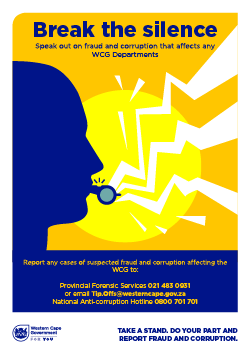Anti-corruption awareness
Governments and businesses around the world lose large amounts of money each year because of fraud and corruption. For Government, these criminal acts impact on their ability to render services to their citizens, while criminals reap the benefits.
 Corruption
Corruption
There are various forms of corruption, but the simplified definition of corruption is when an official or worker abuses their power or influence or fails to act in exchange for a form of gratification (whether for themselves or other), in order to benefit another.
- Offering or accepting a bribe to do something or to refrain from doing what is required;
- manipulating a process or system in return for money, a gift, or a favour; or
- giving contracts or jobs to friends and family.
Corruption can often be difficult to detect. At times what starts as an honest business relationship can be blurred with or becomes a corrupt relationship, especially when it comes to activities such as working lunches, off-site meetings, or the acceptance of gifts.
Consider the following:
“What is the intention behind the offering of the gifts?” and "If I accept this or attend that, will it unfairly influence my professional decisions or could it create an expectation in future?" If the answer is yes, then there is a risk of corruption occuring. For this reason, the Public Service Regulations 2016, contain strict prescripts in respect of acceptance of gifts and the duty to refrain from improper personal gain or engage in actions that will be in conflict with duties.
Fraud
Fraud occurs when a person unlawfully and intentionally makes a misrepresentation that causes actual prejudice, or that is potentially prejudicial to another.
Here are some examples:
- A supplier intentionally inflates the number of hours worked or rate per hour to increase their invoice amount to the WCG.
- A supplier submits fictitious timesheets, falsified invoices or duplicate supporting documents for goods not delivered or services not rendered.
- A job applicant submits his/her CV for a position but the CV contains false information about their work experience or qualifications.
- Officials submit subsistence and travel claims for expenses they have not incurred or inflate the amounts being claimed.
- A supplier misrepresents the B-BBEE status of their company in a tender for goods or services in order to gain extra preference points, placing them in a more favourable position to obtain a contract or tender.
Theft
Theft occurs when a person unlawfully and intentionally appropriates movable property that belongs to another with the intention to permanently deprive the other person of such property.
Examples of theft within WCG include:
- Theft of government assets
- Theft of consumables
The WCG has created structures to help combat corruption, fraud and theft in the public service.
How to report fraud and corruption
Suspicions of corruption, fraud and theft affecting any of the 13 Western Cape Government departments can be reported anonymously to the Provincial Forensic Services by post, telephone, fax or email:
Street address: The Box, 9 Riebeek Street, 10th Floor, Cape Town
Postal address: PO Box 659, Cape Town, 8000
Email: tip.offs@westerncape.gov.za
Tel: 021 483 0931 / 021 829 0219
You also can report corruption, fraud and theft affecting the WCG, or any other government institution, anonymously to the National Anti-Corruption Hotline on 0800 701 701 (toll-free) or nach@opsc.gov.za
Latest Impact Newsletters
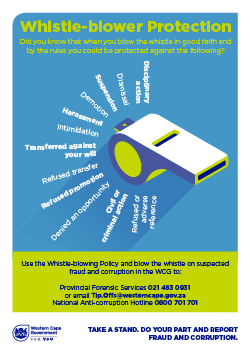 |
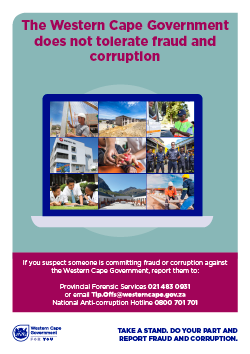 |
|
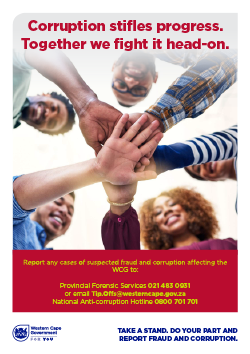 |
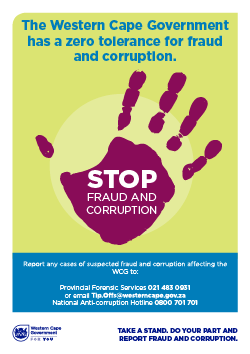 |

